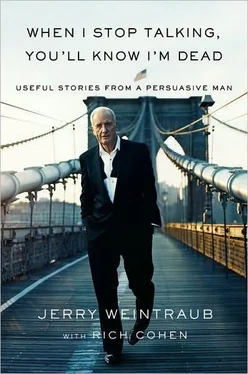I called Levinson.
I said, "I have to make this movie."
"Great," he said, "but you do know that every studio in town has already turned it down?"
"I don't care what they did," I told him. "I love this movie and I'm going to make it."
"Great," he said, "and I'm going to direct it."
"Whoa! Wait a second. I did not know that was part of the deal."
"Yeah," he said, "it is."
Levinson had never directed before, and the script, as he said, had already been turned down. But if you think about it, and I did think about it, this really was his story, his life, and his world: Who could possibly tell it better than him?
"Okay," I said, "as long as I have the right to fire you, I don't care if you direct."
Barry, who had great faith in himself, agreed.
I went all over town with the script, pitched like mad, but no one was interested. It's nearly impossible to sell a story that has no grand concept, reads intimate and small, and is moody in the way a song can be moody-you get it or don't. It was like trying to sell jazz to a person who's never heard Coltrane. Finally, when I was about to give up, David Chasman, an executive at MGM who could really read a script, called.
"How much is this going to cost?"
"Five and a half million dollars."
"We're on."
The key to Diner was casting. For this, credit goes to Ellen Chenoweth, who is one of the greatest casting directors of all time. She understood the script and was able to find real-life equivalents of the characters, clearly based on real guys, among the hungry young actors of LA. My job was to see what Levinson saw, then sell the executives at MGM on a cast of unknowns.
It's no accident that, in the course of my life, I've launched dozens of careers. Like my father, I can look at a sea of sapphires and pick out the Star of Ardaban: the young kid who will blossom on stage, glow on screen, separate from the journeymen to become a star. Diner launched, among others, Ellen Barkin, Mickey Rourke, Kevin Bacon, Daniel Stern, and Steve Guttenberg.
Another favorite of those years was September 30, 1955, about the day James Dean died. It, too, was brilliantly cast, marking the debut of Tom Hulce and Dennis Quaid. That it did not find an audience is a perplexing mystery. Wise men say you learn more from failure than from success, and, though that's often true, in this case failure left me nothing but confused. So many variables determine the fate of a film, some having to do with script and casting and marketing; but others are so mysterious and zeitgeist-related and beyond human control that the best posture is humility. There are three key words in business: I don't know.
Ideas come from many places. Sometimes they arrive in the mail as a script. Sometimes they develop like stalagmites, growing from a slow drip of thoughts. Sometimes they appear on TV, as a story in the news. Take, for example, The Karate Kid. I was at home watching the five-o'clock news. All the stations were broadcasting the same story. It was about a kid in the Valley who had been getting beat up every day on his way home from school. He took it and took it, until, tired of taking it, he found a teacher and learned karate. The next time the bullies came, it was lights out for the bad guys. I loved the story. It reminded me of the ninety-pound weakling ads they used to have for Charles Atlas.
I found the kid. Billy Sassner. I had a car pick up him and his parents and bring them to my office. His dad was heavyset, a postman. His mom was heavy, too. (We made her a character in the first movie, but wrote her out of the sequels; the actress wanted too much money. I told the writer, "Deal with it in the script." It was going to be a funeral or a phone call-the phone call was cheaper.) I told Billy's parents just what I wanted to do, then made a deal for the rights to their story. I hired a screenwriter named Robert Kamen, who, in addition to being really good, knew all about karate, which was, of course, a huge advantage in writing the fight scenes.
The plot was classic-the picked-on kid takes his revenge and the bully gets his comeuppance-but I wanted the movie to be more. Kamen and I knew it was not about karate, not really. It was about fathers and sons. Since the kid has no father in the film, this wise old teacher, this Japanese man named Miyagi, becomes his father. We worked hard to get that right. A lot of Miyagi is, in fact, my father, everybody's father, if not the father you had, then the father you wish you had.
I hired John Avildsen to direct. He had won the Academy Award for Rocky, and The Karate Kid was really just Rocky in another way-it was an underdog story, a Cinderella story and a fantasy, the world as you wish it would be. We signed Ralph Macchio to play the kid, then found the girl. How does the girl fit into the picture? Haven't you ever been to the movies? There's always a girl in the picture! I found her in a Burger King commercial. She jumped off the screen. This was Elisabeth Shue, who later became a star in her own right.
We soon had every major part cast with the exception of Miyagi, the most important part in the movie-the father, the teacher, the moral center, heart, and soul. I went to Hong Kong. I went to Kabuki theaters in Kyoto. I traveled the world looking for this guy. It was a manhunt. I flew the great Japanese actor Toshiro Mifune to LA. He showed up at my office with twenty-five or thirty people. He looked great, but something did not seem right. Whenever I asked him a question, a member of his entourage answered.
"How do you like the script?"
"Mr. Mifune likes the script very much."
"How do you like your green tea?"
"Mr. Mifune likes his green tea very much."
I threw everyone out but Mifune.
I said, "I want to talk to Toshiro myself."
They went out reluctantly, looking back, but they went.
I closed the door and said, "No bullshit now. Do you speak English?"
"No," he said, "not really."
"Then how can I do this picture with you?"
He said he could sound out the lines phonetically-it would sound all right, even if he did not know the meaning of the words.
"No, no," I said, "we can't do that."
Mifune went to Western Costume after the meeting and had pictures of himself taken dressed as Miyagi. I still have them. He looked fantastic. He was a strong man. I was tempted, but how can you play father-and-son scenes phonetically? I called the director John Frankenheimer, who worked with Mifune in Grand Prix.
"How did you do it?"
He told me they shot him in Japanese, went back, and dubbed all his lines into English. I did not have the budget for that. Mifune was out.
I believe in not getting hung up or paralyzed in a quest for perfection, but by the same token, you have to identify what is truly important and hold out until you can get those things right: Miyagi was important. And I could not find him. I was about to put the picture on hold. We would just have to wait until fate brought us Miyagi-san.
Then, one morning, John Avildsen burst into my office, grinning as if he had just made the mother of all breakthroughs, as if he had just found the cure for old age.
"I know who should play Miyagi," he said.
"Who?"
"Pat Morita."
"Pat Morita?"
"Yeah, Pat Morita."
I knew Pat Morita. I knew him when I was busing tables up in the Catskills. He was a hundred-dollar-a-night comic at the resorts. He played a character called "The Hip Nip." He came onstage in horn-rimmed glasses and fake buck teeth and, in a bad Japanese accent, from an old World War II movie, said, "Don't forget Pearl Harbor."
I told John Avildsen, "No. This is a major motion picture. I'm not casting Hip Nip."
"He's great," said Avildsen. "Let him audition at least."
"No fucking way," I said. "Get out of my office."
Читать дальше

![Сьюзан Кейн - Quiet [The Power of Introverts in a World That Can't Stop Talking]](/books/33084/syuzan-kejn-quiet-the-power-of-introverts-in-a-wo-thumb.webp)










